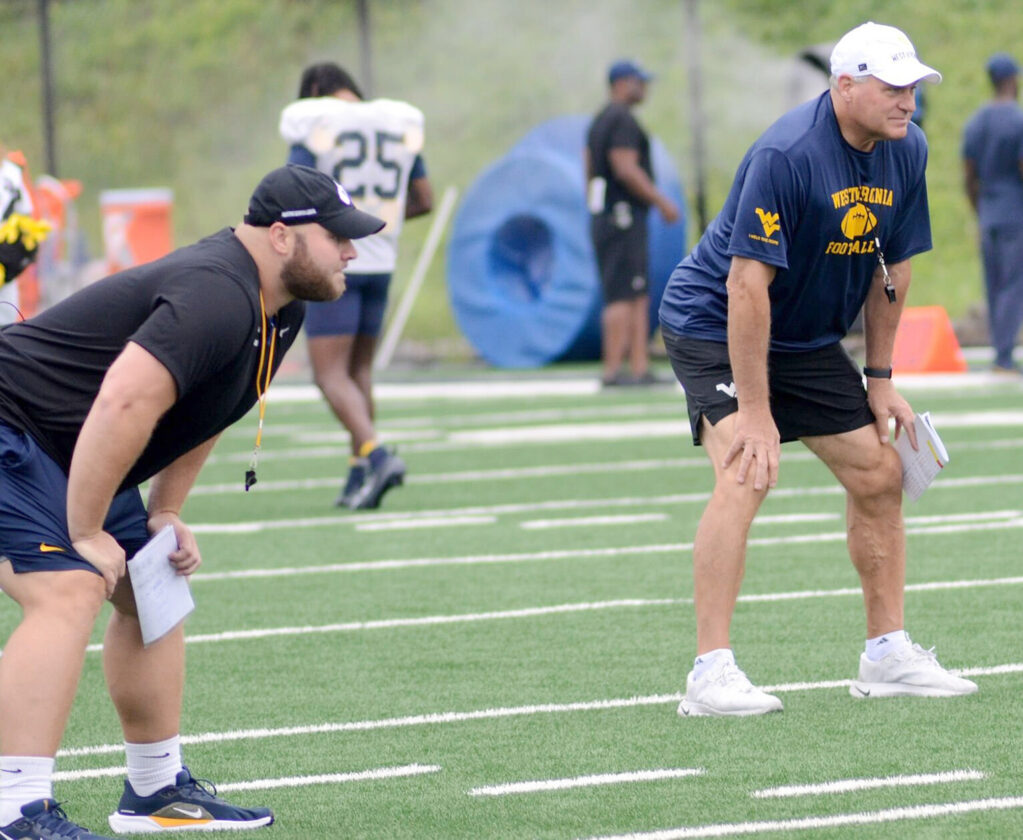WVU coaches don’t rely on outside analytics

Photo by Greg Hunter/BlueGoldNews.com WVU coach Rich Rodriguez, right, watches a drill during practice.
MORGANTOWN — As West Virginia’s football program enters its second week of redesigning all that they do under Rich Rodriguez, three weeks from the season’s kickoff, the evaluation of talent continues, an essential toward not only building a two-deep but in fitting players into the offense and defense the coaching staff has chosen to pursue.
In this modern era where analytics rule, we tend to want to break evaluations down into numbers, more EA Football games than NCAA games, leading to rise of an evaluation service known as Pro Football Focus, known commonly as PFF, a group that grew out of the growth and popularity of the NFL draft, of Fantasy Football Leagues and the need the public had to give order to what has become a national craze, be it NFL or NCAA Division 1 football.
You can turn to any social media outlet and see PFF rankings and ratings and predictions spreading with the heat and speed of a wildfire, quoted as if they were football scripture.
Trouble with that is, it ain’t so.
This is not to say PFF doesn’t do its rankings, ratings and analytics systematically and adequately fill the public’s desire for input data to make their own judgments on. What it doesn’t do, though, is provide the really good football programs with trustworthy information that fills their needs.
What is the art of player evaluation really all about?
WVU Coach Rich Rodriguez defines it quite simply.
“You want to define an evaluation. You know what an evaluation is? That guy is good enough to win with. That’s it. What’s that mean? Plays hard, knows what the hell he’s doing. Don’t make it complicated,” he said during the first week’s practices.
It’s beauty in the eye of the beholder.
College coaches know what they are looking for and know what they are looking at. Evaluation is taking an athlete and predicting where he is headed, not where he has been, which is what ratings are.
Do the Mountaineer players pay any attention to what PFF puts out?
Defensive coordinator Zac Alley, as new school as you can get among Power 4 coordinators, says no.
“I don’t know about the PFF grades, but they can all tell you the EA Sports video game grade. They all know,” Alley said.
It is a sign of the times.
“We laugh. I say I’m going to call them up and tell them to change the numbers on you there,” Alley said. “Somebody did a skit the other day on social media where they had an EA rater out at practice and I laughed. It was hilarious.”
PFF, and whatever other groups there are doing such evaluating outside the cavernous football offices of today, aren’t about to take part in a football team’s evaluation method, not with what has grown to preposterous coaching staff sizes and with the technological innovations that give them endless tape to study.
“I know they care, but I just laugh,” Alley said. “I don’t bring it up to the players because I don’t care. However, that third party sees them doesn’t matter to me. That’s not who’s making decisions on who’s playing, who’s not and how well you do. I tell them the NFL doesn’t care either. They make their own evaluations.
“I couldn’t tell you one guy’s rating on anything. It doesn’t matter. Everybody is going to get challenged the same way and the guy who plays the best will play,” Alley added.
His cornerback coach Rod West also distances himself from outside rating services and their opinions.
“I never brought it up. I know PFF, they have a job to do, but we have our own grading scale. I’m sure at certain times they grade a certain way and they may not even know what coverage we’re doing. We trust our grading process. I think it could bring a certain value for some people, but for us inside this building we don’t refer to that,” he said.
“We look at what we do well. We critique our guys every day. We have our own scale that we trust.”
The players certainly see such ratings, but West says they understand this is no different that preseason polls and predictions, the same ones that had Arizona State last in the Big 12 last year in a season that played out with them winning the title and going to the College Football Playoffs.
“At the end of the day, the players understand I’m the guy coaching them, not some guy in a back room doing PFF. If they come to me and say ‘Coach, I graded higher on PFF, we’ll sit down and watch film together. I haven’t run into that and hopefully I don’t,” West said.
“I know the guys are bought into what we do, know the expectations we have. If you line all our guys up, they can probably tell you before we get to the film … ‘I probably grade out decent today’ or ‘I didn’t do so well.’ They know our expectations and what it’s supposed to look like.”

